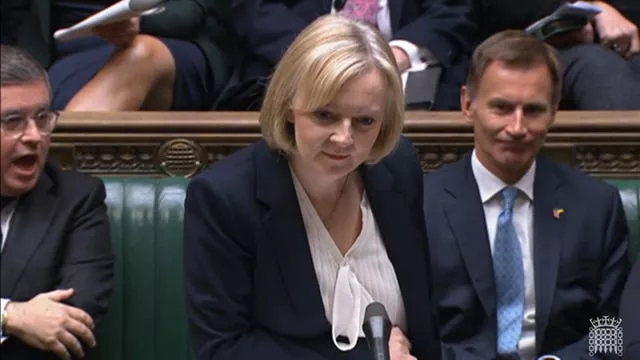The pound has rallied on Thursday as financial markets gave a “damning” reaction to the announcement that British prime minister Liz Truss is stepping down after just six weeks in the job.
Sterling shot up to $1.13 before the speech as markets anticipated that Ms Truss would resign, before paring back gains slightly to stand 0.4 per cent higher at $1.126 after her statement.
Yields on gilts – or UK government bonds – have also eased slightly in response to Ms Truss’s decision.
UK 30-year gilt yields, which fall as bond prices improve, fell back by 0.44 per cent to 3.86 per cent on Thursday.

Neil Wilson at markets.com said the pound’s “kneejerk verdict was damning”, signalling that her move has been welcomed across the markets.
He cautioned that sterling would remain volatile as traders digest what this means for the UK government.
However, he added: “But the initial reaction seemed very appropriate as the market has acted as judge, jury and executioner for the Truss regime.”
It comes after the pound has suffered a tumultuous past two months sparked by the market turmoil seen in the wake of former chancellor Kwasi Kwarteng’s mini-budget – at one stage sterling slumped to its lowest ever level against the US dollar.
A sell-off in gilts sparked by the market chaos also threatened to trigger a mini financial crisis in the UK at one stage, leaving some pension funds at risk of collapse and forcing the Bank of England to step in with emergency action late last month.
The FTSE 100 Index stood 0.1 per cent lower at 6919.6 as the pound’s rally weighed on blue chips, in particular major UK exporters.
Victoria Scholar, head of investment at interactive investor, said investors are welcoming “the potential for a more economically savvy, market friendly leader”.
But she added: “There is still plenty of caution towards the UK as an investment destination given the ongoing political uncertainty, the growing risk of recession and Britain’s persistent inflation problem with price levels hovering at 40-year highs.
“Focus among investors now shifts to the leadership election, the chancellor’s medium-term fiscal plan on 31st October and the Bank of England’s rate decision in early November.”







